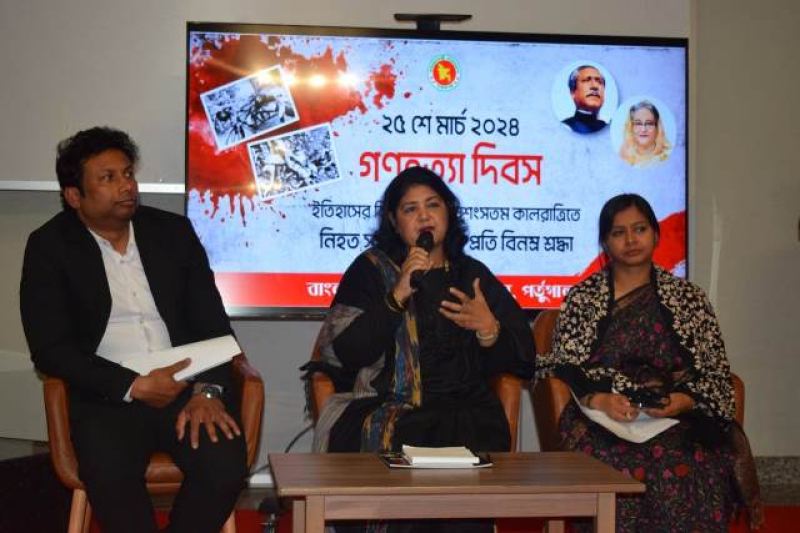- Stock market: DSE fails to sustain early gains, CSE extends rally |
- Illegal arms, disinformation pose major challenges to BD polls: Officials |
- BNP senses ‘dangerous conspiracy’ against democratic transition |
- CEC Vows Credible Election to End Stigma |
- High-level meeting reviews country’s economic progress |
Genocide Day observed in Lisbon

Genocide Day observed in Lisbon
Dhaka, Mar 26 - Bangladesh Embassy in Lisbon observed the Genocide Day with due honour and solemnity on Monday reminiscing the brutal and cowardly attacks by the Pakistani occupation forces on the unarmed Bangalees.
A seminar, a photo exhibition and a candlelight vigil were organised at the Embassy premises on this occasion.
The seminar titled "Bangladesh at 52: Looking back on the Freedom Struggle and Genocide” was held at the Embassy on Monday evening.
University teachers, students from different Portuguese University, scholars, academics, members of Bangladeshi expatriate community and officials of embassy attended the seminar.
The seminar began with observance of one-minute silence in honour of martyrs of Bangladesh Liberation War.
Bangladesh Ambassador of Portugal, Rezina Ahmed paid rich tribute to the Father of the Nation Bangabandhu Sheikh Mujibur Rahman and all the martyrs in the liberation war.
She narrated the massacre that took place on the night of 25th March which continued throughout nine months of War of Liberation.
The Ambassador urged the members of civil society of Portugal and members of international community to support the campaign for the recognition of the Genocide Day 1971.
In the panel discussion, Dr Manas Sutradhar, Professor at the Faculty of Engineering, Universidade Lusόfona presented the keynote speech.
Dr Manas elaborated the aspects of dehumanization, extermination and denial of Bangladesh genocide and remarked that Pakistan should formally apologize to Bangladesh for what they did in 1971.
He urged the international community, particularly United Nation to recognize Bangladesh genocide immediately.
Pedro Anastácio, former Member of the Parliament and City Councilor, in his speech paid tribute and respect to all the victims and survivors who suffered on this day.
He also expressed solidarity with Bangladesh and other countries that had to face the international crime of genocide.
A video documentary containing genocidal incidents of 25th March of 1971, war-time footage of genocide captured by international media and case for recognition of Bangladesh genocide were screened during the seminar.
After the discussion, a programme on “question and answer session” took place where the participant students asked the panelists different question on the genocide of Bangladesh and regarding recognition of the genocide by the international community.
Later, all guests walked in a procession of a candlelight vigil in the premises of the Chancery and placed candles before the portraits of victims of Bangladesh genocide that were displayed as part of the photographic exhibition titled “1971 Genocide”.
The visitors were appalled to witness the horrors of the atrocities perpetrated by Pakistani military and local collaborators.-UNB

